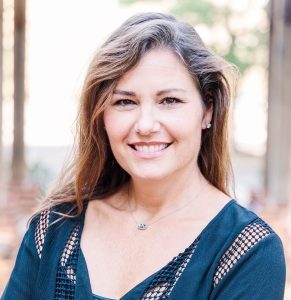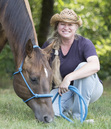Elena Hartwell's Blog, page 33
September 14, 2023
Lost Luna: Wattpad
Lost Luna: A Wattpad story by Heather Miller
Author Interview + Book & Author Info + Author Pet Corner!Don’t miss any author interviews. Click the link here.Lost Luna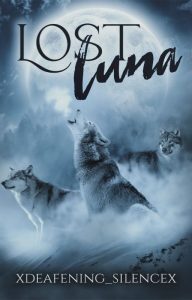 Rescued from a wolf pack who abused and bullied her, orphaned Nova must relearn what it means to be part of a family-and that she too is worth fighting for.
Rescued from a wolf pack who abused and bullied her, orphaned Nova must relearn what it means to be part of a family-and that she too is worth fighting for.
To read Lost Luna, click here.
Interview with Heather Miller, author of Lost Luna Lost Luna features Nova, an orphan. What would you like readers to know about her?
Nova is a character that gets a lot of grief and … I won’t say hate, but dislike from some readers. She isn’t a bold character, especially in the beginning, and for some, that can be hard to stand. She suffers majorly from trauma and struggles in many situations that she is often overlooked. Nova is complex, and it’s something I have enjoyed so much when creating her.
Through the series, she makes gradual, realistic changes. I grew tired of searching for books, particularly fantasy books, where the female lead has trauma and not only gets over it within a day or two, but makes it so simple that it makes ME question why can’t I be like that?
So, I wanted to create Nova to be more realistic. She has, obviously, lived an entirely different life to us in the real world, but I always draw everything back into reality. She has anxiety, depression, suffers with speech problems when nervous; they’re just a few. Her change as a person is gradual and relatable.
She struggles to make friends, feels like she doesn’t fit in, big time imposter syndrome … But as the books progress, she slowly starts to come out of her shell. She becomes more confident and a big part of that is the people surrounding her. From being an orphan, to becoming part of a well-loved member of a family (pack), the changes are out of pure growth in her new environment. Although, not everything is perfect, and there are going to be relapses, moments of feeling like she isn’t worth it, that things are bigger than her.
Nova is funny, she is kind, smart and sweet, and she grows to be brave, stubborn and bold. Nothing, and nobody, is perfect, and I think that I have established that well with Nova.
Lost Luna is about werewolves. What draws you to writing about that particular mythology?I looooove werewolf books. I blame Twilight! I read the books first, and it was the first fantasy series I read, back in perhaps 2009? And from there, came my love of fantasy and wolves; magic and mystery!
I read, and write, to get away from reality, because it can be SO tiring. Reading is an important part of self-healing for me, and I find myself feeling better after I have read a good book, despite how little sleep they sometimes give me (cough staying up till 3am cough).
I love werewolves because I love the idea of soulmates—another person is made just for you. I am very specific in the type of werewolf books I read, because I don’t like it when they are perfect. No couple is, and despite being soulmates, not everything can be perfect, surely?
Also, shifting into a giant furry dog-wolf and running at the speed of light? Count me in. I love that! Haha!
Lost Luna is the first in a series, how many do you anticipate releasing?Lost Luna is book 1, and it continues into four!
Finding Luna and Always Luna are already completed, and guess what? Book four is coming soon! I’m calling it Forever Luna, cheesy I know, but I am so excited to continue this series!
Your work is available on Wattpad, why did you decide to publish on that medium?I have been on Wattpad for over twelve years now! I came across it after being on tumblr back when I was trying too hard to be an emo, skater girl. Cringy. Yep. But tumblr was the rave, and then came Wattpad.
My love for books only expanded! Back then, it was a lot of teenagers writing things poorly, but I am so glad it continued to expand and more people discovered it.
I first started writing for fun, creating a werewolf book called Supernova in 2013 (ish). It got about 300k in five years, and I thought that was exceptional. Little did I know what was coming many years later.
I love Wattpad because you can make friends! So many interesting people from all over the world all joining together to just read. Sharing books, sharing our minds and our desires on paper, for others to explore, is just magical to me. It makes me feel all mushy knowing these people, like me, love to read and that some of them come to my page and give my work a chance! Every milestone feels like the first, and thanks to Wattpad creating this community, I have a place to express myself! It’s dang hard in this world!
What can we find you doing when you aren’t writing?I’m a mum of two! So probably clean up a spilt drink, slaving over an oven top, climbing out of the mountainous pile of washing that magically appeared overnight, or trying to get those 10,000 steps in! Haha!
In all seriousness, being a mum is hard work. You lose yourself quite easily, so it took me some time to try and be me. I also volunteer at a children’s center, which is aimed at babies to five-year-old’s.
So when I’m not doing that, or writing, I am usually reading or trying to discover a new hobby, or sometimes, just doing nothing. Whatever feels good for my mental health! That, or wrestling my dog. He’s funny, a little crazy like the rest of us.
What are you working on now?I am working on book four of the Lost Luna series! I have side projects too, all fantasy of course, but Forever Luna aka book four, is the main gal right now!
Words of Wisdom for Aspiring Writers:Just pick up the pen, the laptop, the phone, and write. I started on my phone, unable to even afford a laptop, and look how far I got! The best decision I ever made was to forget what people may think, because I’m not Heather when I’m writing, I am somebody else. I am hidden, I am an author. I want to create, and if you do too, then that’s all that matters!
Nobody reads your books? Does it matter? Do reads truly mean anything at the end of it all? When you have created this masterpiece that you are so proud of, the best feeling is knowing you did it. Want more reads? Get yourself out there or let fate decide! Tags, Instagram, Tik Tok, they’re all amazing outlets to get yourself out there!
Ask other authors, join discords, comment where you can. Just write and enjoy it. If you are not enjoying it, stop, come back to it another time. Days, weeks, years, whichever. I stopped writing in 2015 when I had my son, and only picked up that metaphorical pen in 2021. It was a LONG break, but I didn’t have things to write then. I do now.
Author Pet Corner!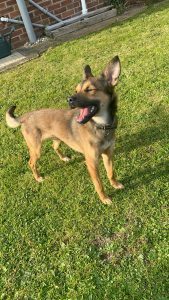 Murphy!
Murphy!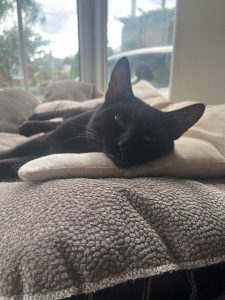 Blake!
Blake!I have Murphy the dog, and Blake the cat!
Murphy is a Romanian rescue, he is an absolute bat-crazy, so loving and embracing dog. He’s 2, and rescuing him gave him a new lease of life, and he gives me so much joy.
Blake was also a rescue, and I got him last year when he was a teeny tiny baby. He’s so unbothered by everything, even when the dog tries to play and nibble his paws, and despite not being cuddly, he has his moments.
He’s a cat, what can I expect other than on and off love? Haha!
Heather Miller, author of Lost Luna
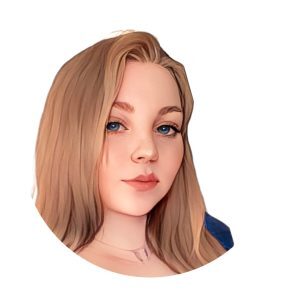
Mum by day, avid fantasy writer by night.
To find out more about Heather, click on any of the following links: Wattpad, Yonder, Instagram, TikTok, Spotify.
Elena Taylor/Elena Hartwell
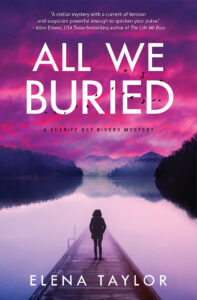
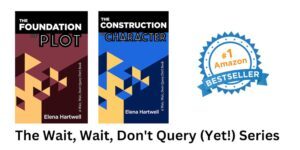
All We Buried, available now in print, e-book, and audio.
Silver Falchion Award Finalist, Best Investigator
Foreword INDIE Award Finalist, Best Mystery
Header Image by 51581 from Pixabay
The post Lost Luna: Wattpad appeared first on The Mystery of Writing.
September 12, 2023
The Deadly Deal: New Mystery
The Deadly Deal, a new mystery by J. Lee
Spotlight + Book & Author InfoLooking for more new books? Click the link here.The Deadly Deal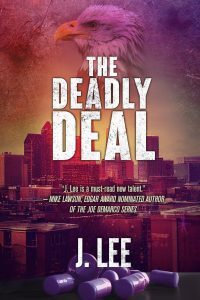 David Centrelli is a junior business development executive at a pharmaceutical company in Richmond with no military training or criminal record whatsoever…but an innocent knock on the door one typical Monday morning changes his life forever.
David Centrelli is a junior business development executive at a pharmaceutical company in Richmond with no military training or criminal record whatsoever…but an innocent knock on the door one typical Monday morning changes his life forever.
Thrust into a world of unbelievable accusations, outrageous claims and danger he’s only seen in the movies, he’s told that his best friend’s death two weeks earlier was no accident, and that his buddy has a message for him from the grave. As skeptical as he is, clues far too specific to be coincidental keep coming, and soon his own home is engulfed in flames. When the perpetrator contacts him, he learns that not only are the accusations legitimate, but that people trained to eliminate problems have labeled him one.
Blackmailed by decisions he made years ago, informed that his brother has been kidnapped, and threatened with a future not even his worst nightmare could imagine, the temptation to give up what he knows and disappear into affluent anonymity grows stronger by the second…until he learns that millions of lives depend on him trying to do the right thing. But can this ordinary businessman really escape death from experts trained to administer it and prevent a colossal calamity already set in motion by the highest levels of government?
To purchase The Deadly Deal, visit the author’s website by clicking the link here. Praise for The Deadly Deal“The Bottom Line: A perfectly crafted conspiracy thriller with a truly noble hero at its core, The Deadly Deal is the twisty tale we’ve been waiting for. Highly Recommended.” – Best Thrillers
“The Deadly Deal is a fast-moving, page-turning thriller propelled by rapid scene changes, frequent plot twists, and an enemy that grows more powerful and menacing as the full extent of the conspiracy. Fans of plot-driven thrillers will find plenty to like…” – Windy City Reviews
“The Deadly Deal evolves superb characterization, satisfying twists of plot, and a focus that will keep even seasoned thriller readers guessing about its outcome.” – Midwest Books
“J. Lee does it again with The Deadly Deal. Fans of mysteries and thrillers will love this new cliffhanger. I was immediately hooked as the story began to unfold and this fast-paced and intriguing mystery kept me guessing until the very last page. Impossible to put down, I finished the book in days and loved every minute of this captivating read!” – Nicky Steinberg, Publisher of Downers Grove Living Magazine
“Action packed and sharply written. Grabbed me from the start and wouldn’t let go. I’ve already made room on my nightstand for the next J.Lee thriller.” – Davin Goodwin, author of PARADISE COVE and the Roscoe Conklin Mystery Series.
“The Deadly Deal is my kind of thriller. Clever premise, complex characters, a pulsating plot and a satisfying, but in no way predictable, ending. Easily J. Lee’s best work, and that alone is saying something.” – Drew Yanno, author of In the Matter of Michael Vogel and The Smart One.
“A terrific follow-up to The Hubley Case and The Silent Cardinal. In The Deadly Deal, J. Lee lays out an explosive tale of political intrigue, government conspiracy, and murder. If you haven’t yet read Lee’s thrillers, it’s time to jump aboard the bandwagon.”–Alfred C. Martino, author of Pinned, Over The End Line, and Perfected By Girls
“Regardless of how you feel about the pharmaceutical industry, this book is a must read. J. Lee pulls you into a fast paced thriller of good vs. evil that never lets up. Tight writing, intricate plot, believable characters and a sharp, fast-moving dialogue that gels it all together. Put this one on your reading list!” – Jesus Leal, author of True Diversity
J. Lee, author of The Deadly Deal
J. Lee is the author of The Hubley Case, The Silent Cardinal, and The Deadly Deal.
He graduated from Duke University with degrees in Engineering and Sociology, and lives in the western suburbs of Chicago with his family.
To learn more about him or his award-winning novels, please visit www.jleethrillers.com.
To learn more about J. Lee, click on any of the following links: Facebook, Twitter, Instagram.Elena Taylor/Elena Hartwell
All We Buried, available now in print, e-book, and audio.
Silver Falchion Award Finalist, Best Investigator
Foreword INDIE Award Finalist, Best Mystery
Header image from Olga_art on Pixabay
The post The Deadly Deal: New Mystery appeared first on The Mystery of Writing.
September 10, 2023
Citizen Orlov: New Thriller
Citizen Orlov, a thriller from Jonathan Payne
Excerpt + Book & Author Info + A Giveaway!
Don’t miss my interview with Jonathan! Click the link here.
Citizen Orlov
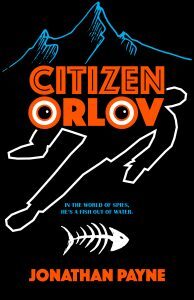
Not every fishmonger can be a secret agent.
Journey to an unnamed mountainous country in central Europe at the end of the Great War. Enter Citizen Orlov, a simple fishmonger and an honest, upright citizen, who answers a phone call meant for a secret agent and stumbles into a hidden world of espionage and secrecy.
Recruited by the Ministry of Security, he is sent on assignment to safeguard the king. But Orlov soon discovers that his ministry handler, the alluring femme fatale Agent Zelle, is planning not to protect the king but to assassinate him.
Caught in a web of plot and counterplot, confusing loyalties, and explosive betrayals, Orlov finds himself on trial for murder. Given the opportunity to clear his name, he finds that the lives of his friends, mother, and fellow citizens hang in the balance.
Book Details:
Genre: Espionage Thriller
Published by: CamCat Books
Publication Date: May 2023
Number of Pages: 288
ISBN: 9780744309010 (ISBN10: 0744309018)
To purchase Citizen Orlov, find it at the following stores: Amazon | Barnes & Noble | BookShop.org | Goodreads | CamCat Books
Read an excerpt:
Citizen Orlov
On a frigid winter’s morning in a mountainous region of central Europe, Citizen Orlov, a simple fishmonger, is taking a shortcut along the dank alley behind the Ministries of Security and Intelligence when a telephone begins to ring. He thinks nothing of it and continues on his daily constitutional, his heavy boots crunching the snow between the cobbles.
The ringing continues, becoming louder with each step. A window at the back of the ministry buildings is open, just a little. The ringing telephone sits on a table next to the open window. Orlov stops, troubled by this unusual scene: there is no reason for a window to be open on such a cold day. Since this is the Ministry of either Security or Intelligence, could an open window be a security breach of some kind?
Orlov is tempted to walk away. After all, this telephone call is none of his business. On the other hand, he is an upright and patriotic citizen who would not want to see national security compromised simply because no one was available to answer a telephone call. He is on the verge of stepping toward the open window when he hears footsteps ahead. A tight group of four soldiers is marching into the alley, rifles on shoulders. He freezes for a second, leans against
the wall, and quickly lights a cigarette. By the time the soldiers reach him, Orlov is dragging on the cigarette and working hard to appear nonchalant. The soldiers are palace guardsmen, but the red insignia on their uniforms indicates they are part of the elite unit that protects the Crown Prince, the king’s ambitious older son. Orlov nods politely, but the soldiers ignore him and march on at speed.
The telephone is still ringing. Someone very much wants an answer. Orlov stubs his cigarette on the wall and approaches the open window. The telephone is loud in his right ear. Peering through the gap, he sees a small, gloomy storeroom with neatly appointed shelves full of stationery.
Finally, he can stand it no longer. He reaches through the window, picks up the receiver, and pulls it on its long and winding cable out through the window to his ear.
“Hello?” says Orlov, looking up and down the alley to check he
is still alone.
“Thank God. Where have you been?” says an agitated voice, distant and crackly. Orlov is unsure what to say. The voice continues. “Kosek. Right now.”
“I’m sorry?” says Orlov.
“Kosek. Agent Kosek.”
Orlov peers into the storeroom again. “There’s no one here,” he says.
“Well, fetch him then. And hurry, for God’s sake. It’s important.”
Orlov is sorely tempted to end the call and walk away, but the voice is so angry that he dare not.
“One minute,” he says, and lays the receiver on the table. He opens the window wider and, with some considerable effort, pulls himself headfirst into the storeroom, where he tumbles onto the floor. Picking himself up, he slaps the dust from his overcoat, opens the storeroom door, and peers along the hallway; all is dark and quiet.
With some trepidation, Orlov returns to the telephone. “Hello?” he says.
“Kosek?”
“No, sorry. I’ll have to take a message.”
The caller is still agitated. “Well, focus on what I’m about to say. It’s life and death.”
Orlov’s hands are shaking. “Hold on,” he says, “I’ll fetch some paper.”
Before he can put the receiver down, the caller explodes with anger. “Are you a simpleton? Do not write this down. Remember it.”
“Yes, sir. Sorry,” says Orlov. “I’ll remember it.”
“Are you ready?”
“Yes, sir.”
“Here it is. We could not—repeat not—install it in room six. Don’t ask why, it’s a long story.”
The man is about to continue, but Orlov interrupts him. “Should I include that in the message: ‘it’s a long story’?”
“Mother of God,” shouts the man. “Why do they always give me the village idiot? No. Forget that part. I’ll start again.”
“Ready,” says Orlov.
This time the man speaks slower and more deliberately, as if to a child. “We could not—repeat not—install it in room six. You need to get room seven. It’s hidden above the wardrobe. Push the lever up, not down. Repeat that back to me.”
Orlov is now shaking all over, and he grimaces as he forces himself to focus. He repeats the message slowly but correctly.
“Whatever else you do, get that message to Kosek, in person. No one else. Lives depend on it. Understood?”
“Understood,” says Orlov, and the line goes dead.
*** Excerpt from Citizen Orlov by Jonathan Payne. Copyright 2023 by Jonathan Payne. Reproduced with permission from Jonathan Payne. All rights reserved.
Jonathan Payne
 Jonathan Payne is a British-American writer based outside Washington, D.C.
Jonathan Payne is a British-American writer based outside Washington, D.C.
He holds a Master of Arts degree in Novel Writing from Middlesex University, London.
His short fiction has been featured at the North London Story Festival and in magazines including Turnpike, Twist in Time and Fiction Kitchen Berlin.
Before moving to the United States, he worked for the British government on matters of national security. When not writing or reading, he can be found in the boxing gym.
To learn more about Jonathan click any of the following links: Website, Goodreads, BookBub, Instagram, X (formally known as Twitter)
Giveaway: This is a giveaway hosted by Partners in Crime Virtual Book Tours for Jonathan Payne & CamCat Books. See the widget for entry terms and conditions. Void where prohibited. The giveaway is for: 2 Hardcover copies, US Only
Visit all the Stops on the Tour
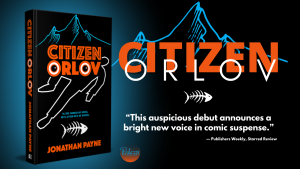
09/06 Showcase @ Mystery, Thrillers, and Suspense
09/09 Guest post @ The Book Divas Reads
09/12 Review @ 5 Minutes for Books
09/12 Showcase @ Celticladys Reviews
09/13 Showcase @ Books, Ramblings, and Tea
09/14 Review @ Guatemala Paula Loves to Read
09/15 Review @ Book Reviews From an Avid Reader
09/26 Review @ sunny island breezes
09/27 Showcase @ 411 ON BOOKS, AUTHORS, AND PUBLISHING NEWS
09/28 Review @ Its All About the Book
10/12 Podcast interview @ Blog Talk Radio
Elena Taylor/Elena Hartwell


V
The post Citizen Orlov: New Thriller appeared first on The Mystery of Writing.
September 7, 2023
The Unexpected Hostage: Debut Thriller
The Unexpected Hostage, debut thriller from Allison McKenzie
Author Interview + Book and Author Info+ Pet Corner!Don’t miss any debut author interviews! Click the link here.The Unexpected Hostage
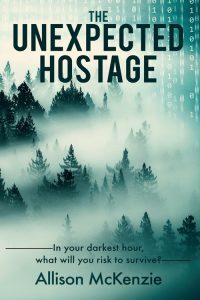 Nothing in her life has been stable since Tess’s beloved fiancé Kyle died in a tragic accident.
Nothing in her life has been stable since Tess’s beloved fiancé Kyle died in a tragic accident.
She’s spent the past year hell-bent on outrunning her grief, jetting between high-stakes meetings and the rock clubs where she can disappear. Avoiding her pain was working—almost—until she and her colleagues are taken hostage by a violent Eastern European terrorist group.
With no means to escape her captors, Tess and fellow captive Mark must rely on one another to survive. Together, they’ll risk their lives and endure a brutal journey toward freedom as they forge a bond that neither can forget.
The mysteries of the past refuse to lay dormant for long as Tess is thrust into the center of another international cybercrime and uncovers the shocking truth about Kyle’s death.
This time, she’ll need Mark’s help to avenge her losses as she races across the globe to save her company…and their lives.
To purchase The Unexpected Hostage, click on any of the following links: Amazon, B&N, BookBub, Apple Books.Interview with Allison McKenzie, author of The Unexpected Hostage The Unexpected Hostage centers on Tess, who lost her fiancé a year ago, and Mark, a man she’s taken hostage with. What would you like readers to know about these two characters?Tess and Mark share intelligence, grit, and a gut instinct to protect others. They’re both experts and workaholics in their respective fields—cybersecurity and trauma surgery.
What’s less obvious is how hard they work to hide their inner fragility resulting from grief and loss. While outwardly talented and successful, they’re both battling demons which push them to various degrees of self-destruction.
For Tess and Mark, their emotional journey to move past the attacks is just as important as the external goals of solving the crime and healing their physical injuries.
What drew you to writing about a terrorist group and a kidnapping for your debut novel, The Unexpected Hostage ?Sometimes I write about what scares me. Since 9/11, terrorism has infiltrated our national consciousness, and the fact we can’t avoid it is scary.
Cybercrime and online fraud has exploded in recent years, and the uncontrolled proliferation of AI is troubling. Combining terrorism and cybercrime feels like a natural fit.
At Microsoft, I worked closely with a cybersecurity executive who was a former U.S. Marine and CIA officer. He barely survived the Beirut bombing in 1983, and his perseverance in overcoming the injuries he suffered is hands-down legendary. He inspired my curiosity about how people survive the unthinkable and start over. What happens after the fires are put out, the ambulances leave, and the news cycle stops? I’d argue love and connection are critical to helping people heal so they can thrive, not just survive.
What kind of research did you have to do for The Unexpected Hostage ?In addition to loads of Internet research, I met some fascinating people.
Highlights included interviewing a Canadian Mountie who talked about policing in British Colombia, a security expert who explained encryption strategy, a U.S. State Department employee (and my high school physics lab partner!), two former CIA officers, and a Seattle policeman who helped avert a terrorist plot.
My most memorable interview was with a trauma nurse who works with Doctors Without Borders. Hearing about the dangerous conflict regions where she works provided the inspiration for Mark Nygaard’s character. When describing working on a trauma team, she simply said, “This is war. Every day.”
You are an adventurer! How similar is your character Tess to you? In what ways do you differ?We couldn’t be more different! Tess’s proficiency with self-defense, weaponry, and survival tactics is beyond me. I’d be hard-pressed to fire a Nerf gun, and I don’t deal well with the sight of blood.
We share one similarity—I worked in the software industry for two decades. For several years, I had an international job and flew all over the world. Tackling lengthy technical meetings while jet-lagged and living on coffee is familiar territory for me.
How did your career in the software industry help you write about cybercrime?I understand how software is built and the conflicts technical and executive groups often experience.
That said, my time working in cybersecurity was a huge change. My new colleagues came from the military, CIA, NSA, or other roles requiring Top Secret security clearances. They spent lots of time in “SCIF rooms” (sensitive compartmented information facilities). Some of the ex-military guys had experienced dark, dark things they couldn’t talk about.
For this group, the phrase “he knows where the bodies are buried” carried a more ominous, literal meaning.
What are you working on now?I’m drafting a second thriller which focuses on a woman who makes a fatal error and tries to build a new life.
Given her unusual past and what she knows (and hides), her old life won’t leave her alone. The story also examines a surprising intersection of the tech, espionage, and art worlds. Also, one (or more) characters from The Unexpected Hostage will make an appearance!
Words of Wisdom for Aspiring Writers:Keep going! Keep writing, editing, and learning. Attend conferences and immerse yourself in your local writing community. The process can be an emotional roller-coaster, so enjoy the journey and always keep moving forward. You can do it.
Great advice!Author Pet Corner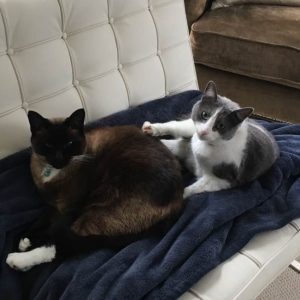 Carson and Elsa!
Carson and Elsa!Carson and Elsa are named for Mr. Carson and Mrs. Elsa Hughes on Downton Abbey.
They’re great writing buddies, although they do tend to bicker over whether catnip should be served in a silver bowl or a plate.
However, they agree catnip should be served daily.
Allison McKenzie
 Allison McKenzie has never shied away from adventure. She is at home skiing Canadian glaciers, exploring Scottish castles, and retrieving cultural artifacts from a Rarotongan jungle as she is at her writing desk.
Allison McKenzie has never shied away from adventure. She is at home skiing Canadian glaciers, exploring Scottish castles, and retrieving cultural artifacts from a Rarotongan jungle as she is at her writing desk.
After graduating magna cum laude from Wellesley College with honors in English literature and attending the University of Cambridge’s International Art History Programme in England, she spent most of her career in the software industry.
Allison is the winner of the 2020 Pacific Northwest Writers Association Contest, and a Finalist for the 2021 Daphne du Maurier Award for Excellence in Mystery/Suspense, from RWA’s Kiss of Death Chapter, for The Unexpected Hostage.
She currently lives in Seattle with her husband, daughter, and two rambunctious cats. She loves theatre, skiing, and Peloton biking to ‘80s New Wave music.
To learn more about Allison, follow her at the following links: Instagram, Facebook, X, LinkedIn, LinkTree.Elena Taylor/Elena Hartwell


All We Buried, available now in print, e-book, and audio.
Silver Falchion Award Finalist, Best Investigator
Foreword INDIE Award Finalist, Best Mystery
Header Image by Mario from Pixabay
The post The Unexpected Hostage: Debut Thriller appeared first on The Mystery of Writing.
September 6, 2023
The Silent Veteran: A Memoir
The Silent Veteran: A Memoir by Vance Becker
Author Interview + Book & Author InfoDon’t miss any author interviews. Click the link here.The Silent Veteran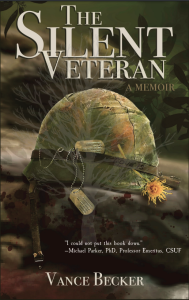 In 1967, Vance Becker fears his younger brother will die in Vietnam. Unable to live with that premonition, he relinquishes his student deferment and is drafted and sent overseas, ensuring his younger brother’s safety. Assigned to a combat unit in the 101st Airborne, Becker leads patrols into firefights and battles throughout the hills and valleys of Phu Bai and faces the stark reality of war. While he forges meaningful relationships with his platoon, he struggles to maintain relationships back home.
In 1967, Vance Becker fears his younger brother will die in Vietnam. Unable to live with that premonition, he relinquishes his student deferment and is drafted and sent overseas, ensuring his younger brother’s safety. Assigned to a combat unit in the 101st Airborne, Becker leads patrols into firefights and battles throughout the hills and valleys of Phu Bai and faces the stark reality of war. While he forges meaningful relationships with his platoon, he struggles to maintain relationships back home.
The psychological destruction of fighting an unethical, immoral war has far-reaching consequences. Decades later, like millions of other veterans, Becker is haunted by detachment, distrust, and shame. The Silent Veteran details his journey through post-traumatic stress to find transcendence in education and a career in psychology, which pulls him into a rewarding and meaningful life with those he loves.
To purchase The Silent Veteran, click on the following links: Amazon, Barnes and Noble, and IndieBound.Interview with Vance Becker, author of The Silent Veteran The Silent Veteran was several years in the writing. What compelled you to finally tell your story, and what was that journey like?Good question. As I wrote in the introduction, I didn’t want this story to come out. It wasn’t a story I was proud of. Serving in Vietnam left me filled with shame and self-loathing. It was a war we did not belong in, and I certainly didn’t belong in it. It went against everything I believed in. Yet, there I was in the middle of it, as deep as you can get.
As I wrote, after my brother’s death and my retirement began, the quiet days of my seventh decade pulled images of Vietnam from thin air. Essentially, they had been repressed all these years. The old yet fresh memories awaken me with nightmares of combat, orphaned children, dead soldiers, and dying voices crying out from the dark. After all these years, I was again filled with shame and guilt, which haunted me deeper.
After fifty years, the truth pushed itself out. It wanted to record the memories and pull fragmented pieces forward to the present into a cohesive whole. The story had its own voice and yearned to push itself out of the darkness of shame into the bright sunlight, hoping for respectability.
The journey of writing was painful, disturbing, and difficult. Digging into it stimulated sleeping nightmares and evoked disturbing, intrusive, unwanted images. Self-loathing intensified. Yet, in the end, clarity, cohesion, and intelligibility finally emerged as these memories were recalled, collated, and integrated. It was satisfying and brought me full circle.
The Silent Veteran takes us back to the Vietnam War and the experiences of being a soldier on the ground. What aspects of your individual story also make this a universal story?War is universal, but no sane person wants it. I wanted absolutely nothing to do with war, especially this one. Young men my age couldn’t help but be affected by its overwhelming impact on our lives. Many, like me, thought it was the biggest mistake in our generation. I believed I understood its history and geopolitics, and how wrong it was for our country to be involved in it.
As a student, I studied the universality of war dating back to the Ancient Greeks. Once in it, I saw my platoon as a tiny band of soldiers caught in a struggle of our time. From the inside, it was no different from the Greek Wars, the War of Independence, the Civil War, WWI, WWII, Korea, or any other war. We were caught in the daily struggle of staying alive, crawling through the mud of southeast Asia. Others had crawled through the trenches of Europe. It was essentially the same for soldiers of all ages. War was bigger than us, our platoon, our country, and our small, insignificant lives.
I tried to make sense of senselessness and reasoned that combat brings an unspoken universal allegiance to warriors from all wars, a private brotherhood, and an intimate knowledge dating back across generations and continents. I imagined there was a silent code of dignity, honor, and consciousness bonding all combat warriors throughout the ages together across every world and all wars.
I instinctively identified with Hoplites, soldier citizens, from Ancient Greece and their combatants, the patriots and the redcoats of America’s Revolutionary War, brothers and fathers from the south and north of the Civil War, veterans from both sides of WWI, WWII, Korea, and every war you can think of.
Now, today, fifty years later, watching or hearing even minor war scenes evokes an inside perspective, an effort to see, hear, smell, and sense what is not shown. I watch with immeasurable, unforgiving hypervigilance. This overarousal lingers long after the scene has passed.
I described the universal feeling inside the experience of lugging a rucksack full of essential life-saving supplies, food, water, ammo, and grenades, looking for trouble, searching for the enemy, and fear of being killed or grotesquely maimed at any moment. I described the lengthy aftermath of the combat experiences of soldiers from many wars I interviewed during my career as a psychologist, soldiers who served in WWII, Korea, Vietnam, Iraq, Afghanistan, and other less-known conflicts.
Despite all our differences, I continue to feel a private bond with veterans, especially combat veterans I don’t know and will never meet. Perhaps it is part of my unconscious search to find missing pieces of myself; fragments are stuck between here and the hills of Phu Bai. Small symbols like a hat, a rifle, a sandbag, or bits of a conversation bring pieces of that fragmented history back to life, for me, from southeast Asia; for others, Europe, Mesopotamia, or more vivid distant memory worlds. I think that may be universal.
The Silent Veteran is an intense and profoundly poignant memoir. What has been the hardest or scariest part about releasing such an intimate portrayal of your experiences?The most challenging part of writing is openly acknowledging to myself and others that I deeply violated my personal ethics and morals. Participating in a war I didn’t believe in was, and still is, profoundly disturbing. I imagined myself living a long life with integrity and honesty, like Socrates, if you will. The Vietnam War changed that essential belief foundation and showed me that I was a much lesser person than my ideal self. Back then, my life circumstances showed me that I didn’t have the courage, will, or personal fortitude to take a strong ethical stand. I made an easier, less principled choice. I went to war. Not my best ethical moment.
I have tried to make up for it by living a purposeful and meaningful life, but the universe teaches us that sometimes our efforts are insufficient. The nightmares and intrusive memories keep the instruction alive. Some lessons are learned through physical diseases, heart disease, and cancer that will inevitably shorten my lifespan, the lingering byproducts of Vietnam’s Agent Orange.
If you could help nonveterans understand one thing about the experience of being a combat veteran, what would that be?I wrote about the universal experience of being in a firefight. The feelings are like no other, as I wrote; the mind races, adrenaline pumps, neurons fire, heart pounds, muscles taut, and extreme emotions cram into the body all at once. Each firefight brings a different level of intensity, fear, and vigilance. The feelings seem to crawl from the belly of the brawl, angst deep from the guts where fear begins, into the pumping bloodstream, through the taut arms and legs, tightened tendons, and flexed muscles, outward to the goosed-bumped skin and quivering flesh and reverberate back and forth in the brain’s survival center. The vigilance begins before the first round is squeezed and continues long past the last spent munitions.
Then it’s over. The noise stops. The body revs on overdrive and tries to normalize. An intense quiet, an eerie silence, seeps through the haze of smoke and smells of the battlefield. The din is followed by cautious glances to take in the damage. Who were the casualties? Was anyone killed? Anyone wounded? Was everybody okay, whole?
In a furtive search, you see muddied, cautiously guarded, wary, alert faces emerge from camouflaged hidden spaces, big eyes searching the terrain, bodies vigilant, nostrils sucking air, hands gripping weapons, clinging to the living moment, looking for friendlies. No deaths. No serious wounds. No casualties.
Then, a flood of relief, reprieve, joy, exhilaration, even jubilation. Jubilation is followed by renewed profound closeness, deepened bonds, and proud, exuberant faces breaking into smiles, laughter, and gleefulness. The emotions shift so fast. We survived! Hallelujah!
Each firefight presents a similar sequence of extreme and intense emotions. The emotions vary depending on the casualties.
This pattern repeats itself with each firefight of the combat soldier, explicitly deepening their bonds with others who survived the same battle. Afterward, the personal internal anguish of the firefight lingers indelibly privately, a scorched memory burned inside each soldier’s sentience. The severity, intimacy, and macabre of casualties mark the burn. The burns are intermingled with monotony, fatigue, sleeplessness, fear, hunger, and thirst, reaching fresh into the mind decades later. The embers are re-inflamed with the slightest inference; sometimes, an innocent, unsuspecting event, like witnessing the tears of a loved grandchild, will evoke recollections of those long-forgotten seared moments.
If you could help combat veterans understand one thing about integrating their experiences into their non-combat life, what would that be?What helped me most was finding purpose and meaning outside of myself, something bigger than me. I found it in education and a meaningful career in psychology.
Another profoundly important factor was finding trustworthy people and trusting them, in small bites at first, then more as time passed. Finding love and being loved was paramount. Self-understanding and acceptance is an ongoing work in progress.
What are you working on now?I’ve always wanted to write about the qualities that make up enduring long-term relationships, primarily marriages. Helping couples maintain them was a central part of my psychological practice for so many years. Many books, particularly testimonials by self-described experts, promote various religious and personal perspectives on successful relationships.
But the truth be told, there are no solid, reliable, practical books on the subject. I think one is sorely needed. I’m toying with writing that book.
Words of Wisdom for Aspiring Writers:I have no wisdom for aspiring writers that hasn’t been already said by the best. Perhaps the simple suggestion of writing down ideas, that occur seemingly out of nowhere, when they happen is a piece of good advice most aspiring writers would find helpful. Before they slip back into the nether where they came. Once an idea slips, retrieving it in its fresh, original form is difficult.
Vance Becker, author of The Silent Veteran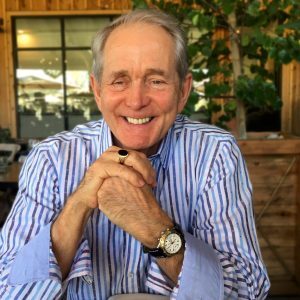 Vance Becker was raised in Central Oregon and Marin County in the San Francisco Bay Area.
Vance Becker was raised in Central Oregon and Marin County in the San Francisco Bay Area.
After five semesters at the College of Marin, he transferred to Cal Poly, Pomona, for a few quarters before being drafted.
He served two years in the Army, one with the 101st Airborne in Vietnam. After discharge, he moved to Fullerton, California, to finish college.
He graduated with a degree in psychology, completed a master’s in counseling, and a doctorate in psychology.
He became a licensed psychologist and served as a clinical psychologist with a multidimensional clientele for the next forty years in Orange County, California. He retired and moved to the Pacific Northwest, where he lives with his wife and oldest granddaughter.
To find out more about Vance, you can follow him on Facebook and Instagram.Elena Taylor/Elena Hartwell


All We Buried, available now in print, e-book, and audio.
Silver Falchion Award Finalist, Best Investigator
Foreword INDIE Award Finalist, Best Mystery
The post The Silent Veteran: A Memoir appeared first on The Mystery of Writing.
September 5, 2023
Reckoning A Neo-Western Crime Thriller
Reckoning by Baron Birtcher
Book Review +Excerpt + Book & Author Info + Giveaway!
Don’t miss any blog tour posts! Click the link here.
Reckoning by Baron Birtcher
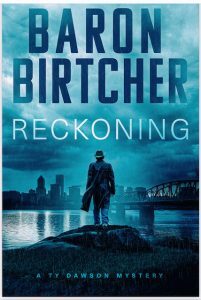
Ty Dawson is a small-town sheriff with big-city problems, in this riveting crime thriller from the award-winning author of Fistful of Rain.
As lawman, rancher, and Korean War veteran, Ty Dawson has his share of problems in the southern Oregon county he calls home.
Despite how rural it is, Meriwether can’t keep modernity at bay. The 1970s have changed the United States—and Meriwether won’t be spared. A standoff looms when the US Fish & Wildlife Service seeks to separate longtime cattleman KC Sheridan from his water supply—ensuring the death of his livestock.
If that’s not enough trouble, a Portland detective is found dead in a fly-fishing resort cabin. Though the Portland police, including the victim’s own partner, are eager to write off the tragedy as a suicide, Ty has his own thoughts on the matter—as well as evidence that points to murder.
His suspicions soon mire him in a swamp of corruption that threatens nearly everyone around him. Turns out that greed and evil are contagious—and they take down men both great and small .
Book Details:
Genre: Neo-western crime thriller
Published by: Open Road Integrated Media
Publication Date: June 2023
Number of Pages: 300
ISBN: 978-1-5040-8280-8
Series: Sheriff Ty Dawson Series, #3
To purchase Reckoning, click on any of the following links: Amazon | Barnes & Noble | Goodreads | Open Road Media
My Thoughts on Reckoning
Baron Birtcher beautifully marries the mystery, western, and literary genres in the latest installment of his Ty Dawson series.
“Ordinarily, Autumn in Meriwether County would come in hard and sudden, like a stone hurled through a window. But this year it snuck in slow and mild, lingered there deceitfully while we waited for the axe to come down.”
And how the ax comes down.
Sheriff of Meriwether County Ty Dawson receives a call from local cattle rancher KC Sheridan, setting off a string of events that could scream from today’s headlines as easily as the 1970s when the series is set.
The battle between rural and city lifestyles echos throughout this spine-tingling mystery, as personal and political agendas place a hardworking rancher in the middle of a covert war. KC could stand in for every farmer facing the loss of water and grazing rights, while Ty Dawson could stand in for every morally outraged law enforcement officer struggling to protect his community from the long reach of corrupt bad actors and those out to benefit from someone else’s loss.
But the fight to protect KC’s cattle is just the tip of the iceberg as Birtcher weaves multiple threads of a story together into a complex plot featuring a complex hero.
In addition to his lawman duties, Dawson also maintains his own ranch, bucking hay and running his own cattle, allowing him to understand the seriousness of KC’s position.
Moving between crime scenes and city hall, and from his ranch to the courtroom, Dawson carries his own history of combat missions in Korea and late nights with ailing breed cows. After years in law enforcement, he’s equally at home in the saddle, behind the wheel of his pickup truck, and staring down the sights of a gun.
Practical to a fault, and haunted by history, Dawson wears his cowboy status like a mantle. The West builds rugged individuals, who also understand the need to protect those unable to protect themselves, often at a great personal cost.
Following in the lyrical footsteps of the cowboy poets, Baron Birtcher also spins a darn good yarn.
For fans of Craig Johnson’s Longmire series and Justified
Read an excerpt of Reckoning:
Reckoning
Prelude:
A TRANSITIVE NIGHTFALL
NO CHILD IS brought into this world with any knowledge of true evil. This they learn over the passage of time. In my experience as a Sheriff, and as a rancher, I have found this precept to be true.
Time passes nevertheless, even if it passes slowly. Here in rural southern Oregon, sometimes it seemed as if it hadn’t moved at all, advancing without touching Meriwether County, except with glancing blows.
That is, until the day it caught up with us all, and came down like a goddamn hammer.
CHAPTER ONE
ORDINARILY, AUTUMN IN Meriwether County would come in hard and sudden, like a stone hurled through a window. But this year it snuck in slow and mild, lingered there deceitfully while we waited for the axe to come down.
The sky that morning was turquoise, empty of clouds, the altitude strung with elongated V’s of migrating geese and a single contrail that resembled a surgical scar, the narrows between the high valley walls opening onto a broad vista of rangeland some distance below. I had expected ice patches to have formed on the pavement overnight, but the weather had remained stubbornly dry, even as temperatures closed in on the low thirties. I tipped open the wind-wing and let the chill air blow through the cab of my pickup as I stretched, and drank off the last dregs of coffee I had brought for the long southward drive from the town of Meridian.
I had received a phone call at home the night before from an unusually distressed KC Sheridan. I had known KC for as long as I can remember, a pragmatic and taciturn cattleman whose family history in the area dated back to the late 1800s, much like that of my own. Three generations of Sheridans had stretched fence wire, planted feed-grass and run rough stock across deeded ranchland that measured its acreage in the tens of thousands, and whose boundaries straddled two separate counties, one of which was my jurisdiction.
But the decade of the ’70s thus far had not been any kinder or gentler to cowboys than to anyone else, and KC and his wife, Irene, had found themselves increasingly subject to the fulminations and intimidation of both local and federal government. While the Sheridan ranch had once numbered itself among a dozen privately held agricultural properties in the region, KC now found himself surrounded on three sides by a federally designated wildlife refuge that had swollen to encompass well over three hundred square miles; a bird sanctuary originally conceived under the auspices of President Theodore Roosevelt’s white house. All of which would have been perfectly fine and acceptable to the Sheridan family, given the understanding that the scarce water supply that ultimately fed into the bird sanctuary belonged to the Sheridans by legal covenant, as it had for nearly a century.
I turned off the paved two-lane and onto a gravel service road, headed in the direction of the ridgeline where KC sat silhouetted against the bright backdrop of clear sky, mounted astride his chestnut roping horse. KC climbed out of the saddle as I parked a short distance away, switched off the ignition and stepped down from my truck. KC trailed the horse behind him as he moved in my direction, took off his hat and ran a forearm across his brow, then pressed it back onto his head. His hair and his eyes shared a similar shade of gunmetal grey, and the hardscrabble nature of his existence as a rancher had been recorded in the deep lines of his face.
“What the hell am I supposed to do about these goings-on, Sheriff?” KC asked, and cocked his brim in the general direction of a reservoir that was the size of a small mountain lake. Two men wearing construction hardhats were surveying a line on the near shore where a third man studied a roll of blueprints he had unfurled across the hood of his work truck.
“Is that who I think it is?” I asked.
“They aim to fence off my water. My cows won’t last a week in this weather.”
“Have you talked to them, KC?”
He nodded.
“’Bout as useful as standing in a bucket and trying to lift yourself up by
the handle. It’s the reason I finally called you, Ty. I didn’t know what else to do.”
The vein on KC’s temple palpitated as he cut his eyes toward the foothills and spat.
“I’ll have a word with them,” I said. “You wait here.”
A wintry wind had begun to blow down from the pass, pushing channels through the dry grass and the sweet scents of juniper and scrub pine. A harrier swept down out of a cluster of black oaks and made a series of low passes across the flats.
I averted my eyes as the sun glinted off the US Department of Fish & Wildlife shield affixed to the driver side door of a government-issue Chevy Suburban. The man studying the blueprints didn’t bother to lift his head or look at me as I stepped up beside him.
“Care to tell me why you and your men are trespassing on private ranch land?” I asked.
The man sighed, scrutinizing me over the frames of a pair of steel-rimmed reading glasses. He had a face that put me in mind of an apple carving, and a physique that resembled a burlap sack filled with claw hammers.
“Who the hell are you now?” he asked.
“Ty Dawson, Sheriff of Meriwether County. That’s the name of the county you’re standing in.”
He took off his reading glasses and slipped them into his shirt pocket, hitched a work boot onto the Suburban’s bumper and offered me an approximation of a smile.
“Well, Sheriff, I’m with Fish and Wildlife—that’s an agency of the federal government, as I’m sure you’re aware—and I have a work order that says I’m supposed to put up a fence. And that’s exactly what me and my crew are doing here.”
I gestured upslope, where KC Sheridan stood watching us, his arms crossed in front of his chest.
“You’re on that man’s private property,” I said.
The government man made no move to acknowledge KC.
“I don’t split hairs over those types of details, Sheriff. The work order I’ve got lays out the metes and bounds of the line, and me and my crew just install the fence where it says to. It ain’t brain surgery.”
“Scoot over and let me have a look at that site map.”
“I oughtta radio this in.”
“You do whatever you think you need to,” I said. “But do it while I’m looking at your map.”
He lifted his chin and looked as though he was conducting a dialogue with himself, then finally stepped to one side. I studied the blueprint for a few moments, looked out across the rock-studded range and got my bearings.
“Looks to me like the boundary line for the bird refuge is at least a hundred yards to the other side of this reservoir,” I said. “Your map is mismarked.”
“The agency doesn’t mismark maps, Sheriff.”
“They sure as hell mismarked this one. You need to stop your work until this gets sorted out.”
“That’s not going to happen.”
“Care to repeat that? There’s clearly been a mistake.”
“No mistake. You need to step away, Sheriff.”
“Let me explain something to you,” I said, removing my sunglasses. “It’s the law in the State of Oregon that the water that comes up on Mr. Sheridan’s property belongs to Mr. Sheridan. Period. If you fence off his reservoir—especially this late in the season—you’re not only stealing his water, you’re murdering his herd.”
The agency man lifted his foot off the bumper, set his feet wide and faced off with me. He slid both hands into the back pockets of his canvas overalls and rocked back on his heels.
“Now it’s my turn to try to explain something to you, Sheriff: I been given a job to do, and I intend to do it. If you don’t walk away right this minute and leave me to it, I will be forced to radio this in. Long and the short of it is, the guys who will come out here after me will have badges, too. And their badges are bigger than yours.”
“I won’t allow you to trespass onto private property, steal this man’s water and kill his livestock.”
He glanced at his two crewmen staking the line then turned his attention back to me.
“You going to arrest us?” he asked.
“What is it with you agency people? Why is it that your first inclination is to slam the pedal all the way to the floor?”
“When me and the boys come back out here, it won’t just be the three of us no more.”
“I’m finished talking about this,” I said. “Pack up your gear and go.”
I could feel his eyes boring holes into the back of my head as I picked my way back up the incline where Sheridan stood waiting for me.
“I can tell by your stride that you had the same kind of dialogue experience I had with that fella,” KC said.
“Bureaucrats with hardhats.”
“I ain’t no cupcake, Dawson. But, you know that those sonsabitches have been tweaking my nose for years.”
“Those men are part of a federal agency, KC, make no mistake. If you’re not careful, they’ll try to roll right over the top of you.”
“What do you call what they’re doing right now? I don’t intend to lay down for it.”
“I’m not saying you should.”
“What, then?”
“Get on the phone and call Judge Yates up in Salem,” I said. “Ask him if he can slap an injunction on these clowns until we get it sorted out.”
Sheridan’s horse pinned back his ears and began to shuffle his forelegs, responding to the tone our conversation had taken. KC calmed the animal with a caress of its neck, dipped into the pocket of his wool coat, snapped off a few pieces of carrot and fed it to the gelding from the flat of his palm.
“I’ll do it, Ty, but I swear to god—”
“KC, you call me before you do anything else, you understand?”
*** Excerpt from Reckoning by Baron Birtcher. Copyright 2023 by Baron Birtcher. Reproduced with permission from Baron Birtcher. All rights reserved.
Baron Birtcher
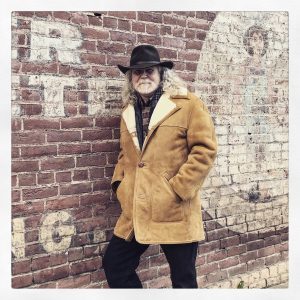
Baron R Birtcher is the LA TIMES and IMBA BESTSELLING author of the hardboiled Mike Travis series (Roadhouse Blues, Ruby Tuesday, Angels Fall, and Hard Latitudes), the award-winning Ty Dawson series (South California Purples, Fistful Of Rain, and Reckoning), as well as the critically-lauded stand-alone, RAIN DOGS.
Baron is a five-time winner of the SILVER FALCHION AWARD, and the WINNER of 2018’s Killer Nashville READERS CHOICE AWARD, as well as 2019’s BEST BOOK OF THE YEAR for Fistful Of Rain.
He has also had the honor of having been named a finalist for the NERO AWARD, the LEFTY AWARD, the FOREWORD INDIE AWARD, the 2016 BEST BOOK AWARD, the Pacific Northwest’s regional SPOTTED OWL AWARD, and the CLAYMORE AWARD.
To learn more about Baron, follow him at either of the following links: Instagram, Facebook.
Giveaway: This is a giveaway hosted by Partners in Crime Tours for Baron Birtcher. See the widget for entry terms and conditions. Void where prohibited. The giveaway is for:
Tour Participants:
06/16 Review @ Confessions of the Perfect Mom
06/20 Podcast interview @ Blog Talk Radio
06/20 Review @ Just Reviews
06/22 Review @ Avonna Loves Genres
09/04 Showcase @ Silvers Reviews
09/05 Review @ The Mystery of Writing
09/07 Showcase @ Guatemala Paula Loves to Read
09/08 Review @ elaine_sapp65
09/09 Showcase @ Celticladys Reviews
09/10 Review @ Book Reviews From an Avid Reader
09/12 Review @ sunny island breezes
09/13 Guest post @ The Book Divas Reads
09/14 Review @ Urban Book Reviews
09/18 Showcase @ Books, Ramblings, and Tea
09/19 Review @ fuonlyknew
09/20 Review @ mokwip8991
09/24 Review @ Melissa As Blog
09/26 Interview @ Hott Books
Elena Taylor/Elena Hartwell


All We Buried, available now in print, e-book, and audio.
Silver Falchion Award Finalist, Best Investigator
Foreword INDIE Award Finalist, Best Mystery
The post Reckoning A Neo-Western Crime Thriller appeared first on The Mystery of Writing.
August 29, 2023
The Hint of Light: Debut Thriller
The Hint of Light: debut thriller by Kristin Kisska
Author Interview + Book and Author Info+ Pet Corner!Don’t miss any debut author interviews! Click the link here.The Hint of Light
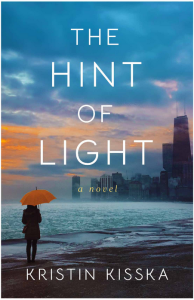
In this heart-wrenching exploration of unconditional love, what a mother finds in the aftermath of her son’s death could put her family back together—or tear them apart for good.
In the wake of her son’s sudden death, Margaret Dobrescu struggles to keep it together in the face of her grief…and her guilt. She can’t help but blame herself for Kyle’s own lifelong struggles—namely, the alcoholism that plagued him.
But within mere days of his funeral, secrets and suspicions begin to surface, and Margaret’s husband admits that Kyle once confessed to having a daughter. Clinging to the hope that some part of her son is still out there, Margaret embarks on a search to find her rumored granddaughter.
What Margaret hasn’t prepared for, however, is the deluge of secrets that keep coming. And as she digs deeper and deeper into her son’s life to find the truth, what she finds instead is that her own secrets can’t stay buried forever.
To purchase The Hint of Light, click any of the links: Bookshop.org, Amazon, B&N, Target, Audible.Interview with Kristin Kisska, author of The Hint of Light The Hint of Light centers on a mother trying to find a granddaughter she didn’t know she had, after her own son dies too young. What drew you to creating a story about three generations of a family and the secrets they kept from each other?A few years ago, a young man who was very dear to me, passed away unexpectedly. Though he’d never been married, in the days immediately following his heartbreaking death, I desperately wished he’d left behind a secret child to carry on his legacy, even though his family and friends knew he’d never had any children. The Hint of Life was the manifestation of that intense wish.
From that seed of inspiration was born the theme of the novel—parenting. I deduced that if the young man in question (Kyle) had had a secret child unknown to his family (Ally), then the person most invested in finding an unknown relative would naturally be his mother (Margaret).
That three generational dynamic offered much fertile ground to explore: father-daughter, mother-son, grandmother-granddaughter, mother-daughter, and even sibling relationships.
Tells us about where The Hint of Light takes place, and how that location impacts events of the story and the characters:My novel is set in Chicago.
Though I’ve lived in Virginia for most of my life, I spent five epic years living just a couple blocks off Lake Michigan in the North Shore area of Chicago. It’s where I met my husband and where two of our children were born. Chicago will forever be a part of my personal fabric.
While living there, I was surprised to learn that Chicago is home to quite a few ethnically-concentrated neighborhoods—especially from Eastern Europe—complete with cultural restaurants, shops, churches, and even use of the host language in those communities. So, when I decided to make Kyle a first-generation American from Romania (a country I lived in for a year), I knew Chicago would be a natural home base for my fictional Dobrescu family.
Despite being set in Chicago-land, the novel’s specific scenes are set in fictionalized places located throughout Chicago. Margaret’s home, Ally’s apartment and her college campus, and a suburban café, are on constant rotation throughout the novel. Since Kyle’s character is struggling to manage his alcohol addiction, however, many of his scenes are set in a fictional residential rehabilitation center and local AA meetings, which offers readers a glimpse into the often-hidden world of alcoholism.
That said, Kyle and Ally spend an evening strolling around the Loop, Grant Park, and even see their reflection in the Bean.
The Hint of Light uses a dual timeline, what challenges did you face writing your debut using that convention?The novel’s dual timeline seemed like the only way I could’ve written this story. Since the domestic suspense elements hinge around Kyle’s death, I strategically needed readers to learn new information at the end of the novel. This structure was the easiest way to organically deliver the story.
The chapters alternate between before and after Kyle’s death. I wrote the story chronologically (all the before chapters first, followed by the after chapters) so that I could keep track of what each character knew and when, especially for Ally. I think if I’d attempted to write the novel in chapter order, I’d probably still be working on it today!
In addition to a dual timeline, readers also experience The Hint of Light through three viewpoint characters, what challenges did you face writing three character’s perspectives?Telling the story through three POV characters was ambitious! When I initially plotted the novel, I used color-coded sticky notes to keep track of which character’s chapter occurred when and in what order.

The Kyle chapters all take place in the before timeline, and the Margaret chapters all take place in the after timeline. However, I struggled with Ally’s chapters because hers occur both in the before and after timelines, and I worried that might get confusing for readers.
At one point, I even tried to eliminate Ally’s chapters for the sake of simplicity, but she offers insight to the story that neither Kyle nor Margaret could, so I kept her. But, to make it easier for readers, I decided to differentiate Ally as a high school student in her before chapters and a college student in her after ones.
Your writing career started with short stories, what did it take to make the jump from that form to novels?Actually, I was in the middle of writing my second novel when I took a break to pen my first ever short story.
I heard about a call for submission to a mystery anthology being published by an annual mystery conference, Bouchercon. My short story of historical suspense, “The Sevens” was the fictional origin story for the notorious secret society at the University of Virginia. It was only after my story was selected that I began to realize how competitive such contests were!
Eight years later, I’m set to release my twelfth short story and my debut novel (of the four novel-length manuscripts I’ve written so far).
What are you working on now?My current novel-in-progress is a women’s fiction/domestic suspense about a pair of sisters, orphaned and separated as little children, who later reunite to find out what happened to their parents.
Words of Wisdom for Aspiring Writers:As 99.9% of authors can attest, writing is a long arduous journey, fraught with rejection and seasoned with occasional impostor syndrome. I believe it’s important to celebrate each compliment, milestone, and achievement along the way, even the small ones. I recommend keeping a record such moments for easy reference when you need an ego boost. I keep a list in a Word document entitled, My Wall of Fame.
I love this idea!Author Pet Corner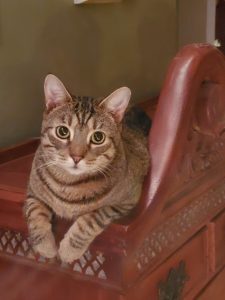 Boom!
Boom!Our family has a two-year old tabby cat, named Boom (short for Boom Roasted). He is our beneficent feline overlord, who begrudgingly tolerates his human pets, and allows us to serve him despite our daily lapses in judgement when we shower him with affection.
We love him so!
Despite being an indoor cat, he has a growing fanclub of neighbors because I strap him up with a harness and leash to take him outside for a daily walkabouts. Can’t get enough of kitties? Follow my Twitter account – @KKMHOO – for a heaping dose of cat photos and gifs.
Thank you for hosting me on your blog, Elena! It’s been a pleasure working with you this year as an ITW Debut, class of 2023-24!
The pleasure was all mine! So thrilled for your debut!Kristin Kisska, author of The Hint of LightKristin Kisska is a native of Virginia, where she currently resides with her family and their moody tabby, Boom.
She holds a BS in commerce from the University of Virginia and an MBA from Northwestern University.
She is the author of a dozen short stories published in anthologies. The Hint of Light is her debut novel.
Kristin loves hearing from friends and readers at www.KristinKisska.com.
To learn more about Kristin, follow her at any of the following links: Twitter, Facebook, Instagram, Website.Elena Taylor/Elena Hartwell


All We Buried, available now in print, e-book, and audio.
Silver Falchion Award Finalist, Best Investigator
Foreword INDIE Award Finalist, Best Mystery
Header Image by Jürgen Polle from Pixabay
The post The Hint of Light: Debut Thriller appeared first on The Mystery of Writing.
August 28, 2023
Loud Water: Southern Gothic Noir
Loud Water, debut novel from Robby Henson
Author Interview + Book and Author InfoDon’t miss any debut author interviews! Click the link here.Loud Water
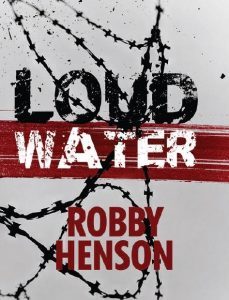
Eight years into a 15-year sentence, Crit Poppwell finally discovered something he was good at, besides destroying his family and abusing drugs. He found art.
The solitary act of drawing, painting and creating brings a calmness and separation from the prison chaos. A dreadlocked Dominican nun who teaches art classes behind-bars encourages Crit to paint the “truth in things.”
She even helps him parole out, back to “bloody” Breathitt County where his brother is the reigning crystal meth kingpin and his ex-wife wants him dead for an unforgivable past crime that haunts his every heartbeat forward.
Crit returns to his Appalachian hometown with ringing tinnitus in his ear from a prison brawl, and a desire to change his DNA. But he soon meets a hot-mess substance abuser and her son, and his reluctant, then fully committed desire to help her puts him in the crosshairs of his brother’s wrath.
Can Crit flush the past from his blood and bones and use his newfound creativity to change his life and save others? Or die trying?
To purchase Loud Water, click on the following link: Down & Out Books.Interview with Robby Henson, author of Loud Water Loud Water is set first in prison and then a town in Appalachia. Tell us what it was like writing about those two environments?The story on which my novel is based was originally a screenplay that I worked on with the filmmaker Charles Shouse.
Charles is from the Appalachian town of Jackson, Kentucky, the primary backdrop of the story. I did work in the film industry for a number of years and wrote and directed several crime and thriller films. And I always believed strongly in this story. And during the recent Covid pandemic, when I had some down-time I challenged myself to tell this story in the novel form. The novel did change greatly from the screenplay, it went more internal, stretched out a bit, the world got flushed out with more characters and situations. And I struggled to develop a writing style in the 3rd person that allowed the reader to feel the subjectivity of the main character.
Nobody told me I had to do that, but after writing the first couple of pages, I became aware that’s what I wanted to do and was trying to do on every page. In regard to the source material, I always believed strongly in its core story about an inmate who struggles to change his DNA through creativity. I actually work with a prison program Voices Inside that teaches writing and performance skills behind bars, and the incarcerated artists I work with in that program were also a big influence.
What would you like readers to know about Crit Poppwell, protagonist in Loud Water ?One of my big influences in writing Crit’s character was the screenplays of Paul Schrader (Taxi Driver, Raging Bull) and particularly his last film First Reformed with Ethan Hawke as a tortured priest. The primary conflict in Schrader’s film’s is always a protagonist fighting himself. Likewise, Crit, as a character, struggles to change his life, so he can help others, but when he’s saddled with so much guilt and baggage, he’s a poor bet to succeed, but I’m hoping the readers are rooting for him.
What is the significance of the title, Loud Water ?I came to the idea late that Crit suffered from tinnitus from an un-provoked prison yard brawl. But it made a lot of sense, when I put that in, that a character saddled with so much guilt might have a grinding symphony in his head that only he can hear.
The description of the tinnitus as sounding like Loud Water in a creek after a rain came to me in a poem by the poet Maurice Manning who used that phrase to describe a Kentucky creek.
Loud Water has been categorized as noir and Southern Gothic noir, what do those subgenres mean to you? How do those conventions play out in your debut?I have been a big fan of Southern Noir, both in film and on the page. I absolutely love Winters Bone, both the book and the movie.
Woodrell and MacCarthy are the top of the heap, to me, in Southern crime fiction. In my opinion, Southern Noir means a strong sense of place is just as important as the crime plot and character.
You have also worked in film and theater. How has your experience with the stage and screen impacted you as a novelist?I got an opportunity early in my film career to work with Norman Jewison and hear his stories about making In the Heat of the Night, and his 30 other films. That was a big influence.
I’ve written over 40 screenplays and only a handful got made. I think that struggle and experience in the film business really hammered into me the importance of story and character. When I started writing Loud Water I didn’t know if I could write a novel, and then I did.
I feel eternally blessed and so grateful that Down and Out Books accepted it for publication and my first book won’t end up in a box in my closet. Whew. Dodged the bullet there.
What are you working on now?I’m working on a novel set in prohibition about a revenue agent that is very loosely based on my grandfather. And every once in a while someone will still bring up a film project and I’ll get overly excited for minute, but I’m liking this novel thing, it’s less dependent on the whims of others, as my main creative outlet going into the future.
Words of Wisdom for Aspiring Writers:Read a lot. Know what gets you excited in the work of others and why. And I remember I picked up an aphorism somewhere, that stuck in the back of my head—forge sentences that have some kind of truth in them. Each one of them.
Great advice! Thanks for visiting with me and my readers, best of luck with your debut.Robby Henson, author of Loud Water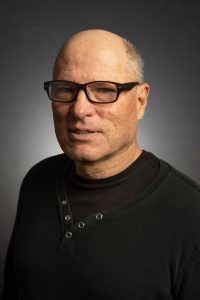 Robby Henson is a filmmaker, screenwriter, theater director and arts-behind-bars instructor.
Robby Henson is a filmmaker, screenwriter, theater director and arts-behind-bars instructor.
He received his M.F.A. from NYU’s graduate film school and has written and directed several documentaries for PBS as well as five feature films—The Badge, Pharaoh’s Army, The Visitation, House, and Thr3e.
His films have been seen at Sundance and around the world and he is a member of the Writers Guild of America.
He currently teaches screenwriting at the University of Kentucky and is also Artistic Director of Pioneer Playhouse, a regional theater in central Kentucky, where he runs their outreach program Voices Inside that instructs incarcerated writers in writing and performance skills so as to fight recidivism.
To learn more about Robby, check out his website.Elena Taylor/Elena Hartwell


All We Buried, available now in print, e-book, and audio.
Silver Falchion Award Finalist, Best Investigator
Foreword INDIE Award Finalist, Best Mystery
Header Image by Ichigo121212 from PixabayThe post Loud Water: Southern Gothic Noir appeared first on The Mystery of Writing.
August 24, 2023
Fadeaway Joe: A Debut Thriller
Fadeaway Joe, the debut thriller from Hugh Lessig
Author Interview + Book & Author Info + Author Pet Corner!Don’t miss any author interviews. Click the link here.Fadeaway Joe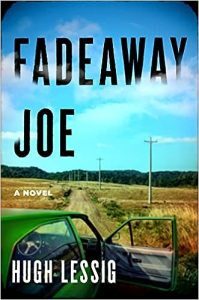 Perfect for fans of S. A. Cosby and Allen Eskens, Joe Pendergast must go all in one last time as he grapples with the ghosts of his past–and present–in this gritty, high-stakes thriller.
Perfect for fans of S. A. Cosby and Allen Eskens, Joe Pendergast must go all in one last time as he grapples with the ghosts of his past–and present–in this gritty, high-stakes thriller.
Sixty-four-year-old Joe has known violence his entire life. For forty years, he’s worked as an enforcer for loan shark and close friend Maxie Smith, breaking more than a few bones along the way. When Maxie abruptly fires him, Joe isn’t sure where to lay the blame—on Maxie, the man he once considered his brother, or on the early-onset Alzheimer’s that made Maxie lose faith in him in the first place.
To keep his head above water, he begins to operate a food truck that’s barely getting by. Desperate to regain some purpose in his life, Joe makes a life-altering decision: he’s going to take down Maxie Smith by any means necessary, once and for all. However, his plan of revenge is sidelined when he meets twenty-two-year-old Paula Jessup, a wise-cracking amateur detective with a few scheming cards up her sleeve, who’s on the run from a trafficking ring she’s been investigating. The two form an unlikely bond: Paula needs some protection and Joe needs a purpose.
With the stakes running high and the clock ticking down—will this gamble pay off?
To purchase Fadeaway Joe, click on the following links: Amazon, Penguin Random House, Barnes and Noble.Interview with Hugh Lessig, author of Fadeaway Joe Fadeaway Joe focuses on Joe Pendergast, a man with early-stage dementia, what drew you to writing about a character with that condition?My father had early-stage dementia some years ago. He was a retired truck driver, a U.S. Marine who came home from Okinawa in World War II and a star baseball player in high school. He’d never been sick, and his slow decline was difficult to watch.
Years later when I envisioned Fadeaway Joe, I wondered how a diagnosis would affect a man who depended on his fists to make a living, and how his “family,” in this case a criminal enterprise, would view it.
The answers to both questions pose big problems for Joe. First, although he is still physically imposing at the start of the story, he knows his time is limited. Second, the criminal organization has abandoned him, which puts him a path of revenge.
What else would you like readers to know about Joe?Joe faces hard choices. On one level, this story is a straight-up crime novel, but it’s also about a man looking back on the decisions he’s made (most of them bad) and considering how he wants to be remembered.
It’s about the decisions we make as our lives are winding down.
In Fadeaway Joe , Joe forms an unlikely alliance with Paula Jessup, what would you like readers to know about her?Paula is newly homeless, living out of her car. She’s on the run from labor traffickers, having disrupted their operation by rescuing a woman. She fancies herself a detective. She’s biracial, physically fit and wears her hair in a Mohawk.
Paula meets Joe by happenstance early in the story, and two are complete opposites. She does a great job of pushing Joe out of his comfort zone. Yet she is drawn to him because he can provide the sort of protection she needs. She is both concerned and fascinated by his controlled violence—he defends her a couple of times from thugs—and she wants to help him get revenge on his boss, but in a more nuanced way.
Prior to writing your first novel, you worked as a journalist—how did that career prepare you to write fiction?Working as a newspaper reporter requires you to write under all types of circumstances: when you’re rushed, tired, stressed, sitting a hotel lobby or airport terminal, or when you simply don’t feel like it. You still have to press your fingers against the keyboard. This is great training for fiction writing.
I don’t need to play my special music or settle in my special place. (That said, I do have favorite music and a preferred place, so maybe I’m getting soft in my old age!)
Journalism also teaches you how to work with editors, to accept feedback and changes. And of course, you meet all sorts of people who are experiencing highs and lows.
I’ve interviewed lottery winners and workers who have been laid off from their jobs. I covered the aftermath of the Haiti earthquake, traveled with doctors to Ecuador and spent two weeks in pre-war Ukraine in 2018. You meet all sorts of people, and they are all fodder for stories.
In addition to novels, you also write short stories, how do those two categories of literature differ? Do you approach novels differently than a short story? What is your writing process like?I struggled to make the transition from short stories to novels. Writing short stories came naturally, probably because of my newspaper background. A novel seemed like gargantuan task.
At first, I outlined everything from beginning to end. That resulted in two novels in the drawer, unsold. I am not a pantser who can start from scratch. I gradually developed a hybrid process where I outline major points along the way, but leave room for discovery.
When I start, I need to know the beginning and the end. I need to know major characters. But other characters will pop up and demand their voices be heard, and the ending isn’t what I always envisioned.
I learned to enjoy the journey and allow myself to be surprised along the way.
I love how you learned to enjoy the journey!What are you working on now?I’m working on a stand-alone novel about a small-town thief trying to reform her ways.
She is blackmailed into burglarizing the home of a rich woman. Instead of cash, she uncovers evidence of a secret that will alter the history of her hometown and put prominent people in jail. But will people believe a thief-turned-whistleblower? It is tentatively titled MALLETS and is about the secrets that live and fester in small towns. (Fester is a bit much. I really like small towns.)
I have three short stories coming out in anthologies from Down & Out Books, including a collection of tales set in the Prohibition era that will be released in September.
Words of Wisdom for Aspiring Writers:I keep a quote from Andre Dubus near my desk: “Talent is cheap. What really matters is discipline.”
I don’t know that talent is cheap. Heck, talent is great, but it means nothing without persistence and discipline.
One of my favorite books of all time is titled, Working Days. It’s the journal kept by John Steinbeck as he wrote The Grapes of Wrath. He finished it in three months. With a pen! I can’t stress enough the value of simply getting words onto the page. Don’t wait for drops of blood to form on your forehead or lightning bolts of inspiration. Sit in your seat. Press your fingers against the keyboard.
Author Pet Corner!
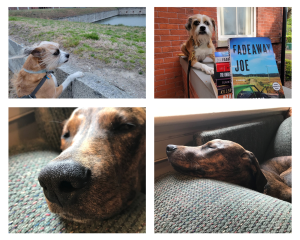
My girlfriend, Shana, and I have dogs. Gus is our grumpy old man, a border terrier who tends to be social on his own time.
Our newcomer is Daisey May. She is a Plott Hound, which I never knew existed until we adopted her from rescue shelter.
I can’t think of a better dog for me, since I tend to be plot-challenged. So far, Daisey hasn’t offered any suggestions, but I’m holding out hope.
Hugh Lessig, author of Fadeaway Joe
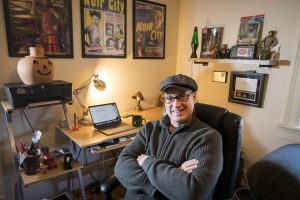 www.heatherhughesphotography.com
www.heatherhughesphotography.comHugh Lessig spent more than thirty years as an award-winning newspaper reporter, covering everything from city council meetings to the earthquake in Haiti.
Along the way, he’s met people at the highs and lows of life and interviewed accused murderers and governors, welders and lawyers, and old men who fought our nation’s wars.
Born in eastern Pennsylvania, he moved to Hampton Roads, Virginia, in 1997.
His short stories have appeared in Thuglit, Shotgun Honey, Crime Factory and Needle. In addition, his work is featured in the following anthologies: Mickey Finn 21st Century Noir, Volumes I and II; Groovy Gumshoes: Private Eyes in the Psychedelic Sixties; and Guns & Tacos. Fadeaway Joe is his first novel.
To find out more about Hugh, check out his website, Facebook, or Instagram.Elena Taylor/Elena Hartwell


All We Buried, available now in print, e-book, and audio.
Silver Falchion Award Finalist, Best Investigator
Foreword INDIE Award Finalist, Best Mystery
Header Image by Rudy and Peter Skitterians from PixabayThe post Fadeaway Joe: A Debut Thriller appeared first on The Mystery of Writing.
August 23, 2023
Echo From a Bayou: New Suspense
Echo From a Bayou, by J Luke Bennecke
Excerpt + Book & Author Info + Guest Post!
Don’t miss any blog tour posts! Click the link here.
Echo From a Bayou
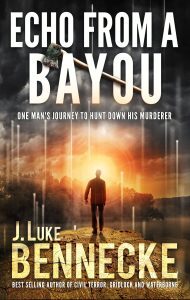
Murder. Treasure. A supernatural twist.
John Bastian is plunged into a dangerous journey to uncover the truth about his past life after a freak skiing accident unlocks hidden memories. With unshakable visions of a brutal attack, the cursed Lafayette treasure, and a captivating redhead, John searches to find answers and confront the man who murdered him. On a perilous path and with a hurricane fast approaching, John fights for his survival and the safety of those he loves, threats haunting him at every turn.
Will he find redemption, or be consumed by an unquenchable thirst for revenge?
Genre: Suspense Thriller Published by: Jaytech Publishing Publication Date: August 2023 Number of Pages: 400 ISBN: 9780965771559
To Purchase Echo From a Bayou, click on the following links: Amazon | Goodreads
Read an excerpt:
Chapter 1
John Bastian
November 8, 2016 – Mammoth Mountain, CA
Never had I seen so many angry trees in one place.
Through a gondola window covered with spider cracks, ominous mountains loomed in the darkened distance. One peak in particular, a white, snowcapped giant, laughed at me with his frozen face and pointed pines, pompous with knowledge he had risen to life, fallen, and rebirthed his dominance over countless millennia.
Ignoring the familiar tug to spiral down another rabbit hole of negativity, I instead envisioned myself racing down a crazy-steep, treeless, triple black diamond slope at the summit of Mammoth Mountain: Huevos Grande.
Passengers continued to pack inside the already-full car, oblivious to our collective need to breathe oxygen, already limited in the high-altitude air that smelled of sweaty gym socks.
“And I don’t see you wearin’ no helmet,” Kevin said.
“Enough about Sonny Bono already, that was a long time ago,” I said, glancing down at Kevin, who, at a foot shorter than me, sported matching black ski pants and jacket with a rainbowcolored voodoo doll embroidered on the back. The snowboarding boots boosted his height by two inches, bringing his height up to five feet five inches.
My closest friend for the last two decades and best man at the wedding of my disaster of a marriage, we’d met at track practice during senior year of high school.
With my last shred of patience wearing thin, I waited with Kevin in the front corner of the room-sized orange cube, near the sliding doors. Skis propped and steadied with one hand, I gave his down-insulated shoulder a friendly punch with the other and said, “Stay positive, man. We need as much optimism as we can handle.”
“Glad you finally gettin’ your head outta them clouds,” Kevin said. “Sooner you forgive Margaret, sooner you can get on with your life, Johnny Jackass.”
“You know I hate it when you call me that.”
“Exactly.”
Two months ago, he’d suggested this trip to some of California’s highest slopes in order to check off the last item on our mid-life crisis bucket list.
One final group of skiers jammed inside, jerking the box that would soon glide us up to the peak of peaks. My heart flopped around inside my chest as I ignored the instinctive urge to go back to our room and down a double bourbon. Instead, I adjusted my black beanie, giving Kevin a forced smile. A tinge of alcohol withdrawal headache pinged my noggin. I dug out two Tylenol gel caps from my inner jacket pocket, popped them into my mouth and swallowed without water.
I tightened my lips and turned my head, glancing through a different gondola window, up to the 11,000-foot peak riddled with wide, white, invincible slopes.
But a shiver crawled up from my legs to my neck, deflating any remnants of confidence.
I tapped open a weather app on my phone. “This might be the last run. That huge storm front’s almost here.”
“Word.”
We both enjoyed the occasional humorous embellishment of stereotypical hip-hop culture, even though Kevin had two masters’ degrees from Berkeley, one in American history and another in theater arts.
After separating from Margaret three years ago, the entire divorce process continually marinated in my head, but I wanted—needed—to lick my mental wounds, get on with my life, and find a new purpose. Hence my agreeing to this trip.
Heads bobbed among the other snow enthusiasts, along with a colorful assortment of mirrored goggles and insulated garments. My height allowed me an unobstructed view of my fellow sardines.
“Think of all the times they said it was supposed to rain back home in Newport Beach,” I said. “Nothing. Just a few drops here and there. Damned drought’s horrible.”
A man with dark, heavy-lidded eyes stood five feet away from us in the rear of the gondola, wearing a baby blue sweater and black jeans. Then for no apparent reason, he started tapping his forehead repeatedly on the gondola wall.
Dude wore no ski jacket.
No ski pants.
Odd.
Short and thin-framed, as he rubbed the nape of his neck, his entire presence screamed of fear and anger. Black-rimmed glasses sat atop his nose, above a thick Freddy Mercury mustache, his face flushed red.
Kevin bounced up and down several times, arms crossed, rubbing his outer shoulders, probably to increase his blood flow. Too much caffeine for him. Again.
“So, tell me ’bout this good news you got,” Kevin whispered, shivering. The primary reason we’d listed this ski trip on our bucket list five years ago was an excuse to spend some “bro” time away from work, away from our real lives. Now it served as a way for me to hide from my memories of Margaret.
But it wasn’t working.
Leaning in close to Kevin to make sure nobody else heard our discussion, I said, “We got a big real estate deal set to close on a sweet piece of beachfront commercial property. Killer views. And with that single commission, I’m planning to rebuild my brokerage.”
A thought wandered into my mind, of creamy smooth whiskey flowing gently over my tongue and down into my gut. Something to sooth my frayed nerves.
Kevin smiled with his huge, toothy grin and jumped again. “That’s what I’m talkin’ about.”
I don’t know why, but the overall appearance of the mustached man in the corner, coupled with his darting glances and multiple throat clearings, gave me the willies. I turned away, trying to ignore him and his negative vibes. Finally, the line to the gondola had shriveled to two skiers, a mother and her young son. The kid had a smile the size of a crescent moon as he crossed the threshold from the loading platform to the gondola. But his boot snagged on the lip of the doorway. He landed hard on his knees in front of me and, with a loud grunt, rolled onto his side.
I leaned down, extended my arm, and helped the hundred-pound fella to his feet.
The kid smiled, thanked me, and I patted him on the back. “No worries.”
His mother placed her hand over her chest and gave me a thankful glance. A pleasant warmth filled my heart.
The lady in charge of the gondola stuck her head inside and gave a brief speech about the trip lasting fifteen minutes, staying inside the safety areas, avoiding out of bounds markers, and something about having fun.
“What’s up with this cracked window?” a man interrupted with a raised voice, pointing to the rear corner.
“Scheduled for repair tomorrow.”
“Jesus,” the man muttered to himself, waving off the woman.
Seconds later, the doors slid shut and we started our ascent.
Halfway up to Mammoth’s highest ridge, the inside of my right shoulder started throbbing. Strong. Like never before. After dropping forty pounds over the past six months, every joint of my now two-hundred-pound body ached and moaned whenever I moved. I hoped the Tylenol would work its magic soon.
A loud metal-on-metal screeching noise filled the air and with a thundering thud, the haul cable crashed to a dead stop. Everyone covered their ears.
Our car continued its forward momentum. We swayed up, peaked, and arced backwards, like a giant, slow-moving pendulum on an old grandfather clock.
Passengers screamed.
I braced my back against the gondola wall and scanned the surface of the tiny sea of forty or so shuffling, mumbling human souls, all of us suspended mid-air and clinging to life by a thin, wobbly, and probably frayed cable.
I craned my head and peeked downward and immediately wished I hadn’t. My stomach lurched. A jagged, rocky crevasse stared back up at me from hundreds of feet below us.
“I knew we shouldn’t have come up today,” a woman said.
Emergency amber lights flashed and a broken tin-can voice shot from inside a wall speaker. “. . . worry . . . got . . . down . . . soon. Sorry for . . . thank you . . .”
Human voices mumbled. Our car continued to sway back and forth. Kevin stared at me with rapidly blinking eyes.
Wire tension ebbed and flowed, bobbing us up and down.
The mustached man standing in the opposite corner of the gondola rubbed his temples, bared an assortment of mangled teeth, and banged his fist several times against his forehead. His eyes darted left to right. He squatted and I lost sight of him behind a rather hefty woman wearing an all-pink jumpsuit.
I leaned toward Kevin. “Something’s wrong with that dude.”
Chapter 2
Kevin glanced toward the mustached man in the gondola. “Something’s wrong with us.” He jerked his arms and legs, squirming. “This ain’t cool, man. We ain’t supposed to be hangin’ up here in the damned sky like this. I’m ’bout ready to freak my ass out right now.”
The car started free-falling toward the earth, filling the gondola with terrified screams and giving me a weightless feeling. But only for a split-second. Another boom, then we slammed to a sudden stop. I struggled to overcome g-forces that easily doubled my weight.
The mustached man stood, wiped his brow, grabbed at his chest, and hammered his head three times against the gondola wall. “Stop it. Leave me alone, Jacques. I can’t breathe,” he yelled to absolutely nobody. “Need air.”
Arms above his head, he’d rotated one of his skis horizontally above him, ramming the front tip through the cracked rear window, shattering the plexiglass. More screams. He threw down his ski and, climbing onto the handrail, punched out the remaining shards and grabbed the inside of the window frame, pulling his head and upper torso through the opening.
A burly, bearded man from the crowd grabbed the guy’s leg, but took a boot to the face and landed hard on his ass, blood pouring from his nose, lips, and chin.
Kevin and I bolted toward the escapee, trying to seize the man’s flailing legs and wrestle him back to safety.
Before we could pull him inside, the car jolted back to life, yanking us all sideways. Kevin and I fell off balance, both losing our grip on the man’s legs. The gondola continued its trek upwards toward the peak, the inertia sucking the rest of the man’s body out the window.
I jumped and thrust my entire upper body through the window opening. Looking straight down the side of the car, I fully expected to see a falling body. But instead, the man dangled from the side, gripping the sill with one hand. His glasses slipped from his face and plummeted toward the canyon below.
Then he looked at me. We connected.
Fear engulfed us both. Pure, primal panic.
The distant rocks below made my vision spin. Finding untapped internal strength, I somehow managed to grab hold of his right wrist and forearm with my gloved hands and told myself to focus. “Hold on. I got you. Give me your other arm.”
Legs flapped in the open air, he struck the side of the car, bouncing and slipping along the wet metal. Someone grabbed my waist and secured me. But I wiggled my way further out the window another couple of inches, waiting for the right moment to let go with my right hand and grab the left wrist of this crazy man.
My abdomen slid against plexiglass shards still embedded in the windowsill, sharp pieces scraping along my jacket, poking, pushing, prodding into my belly. The padding in my gloves only handicapped my grip, my forearm muscles pulsating and burning to quit.
“Stop messin’ around and pull that dude back inside,” Kevin said from inside. “Before we get to the next support tower.”
Both my forearms begged to release their grip. I doubled my efforts to maintain a solid hold on the dangling man while turning my head, looking forward to the other side of the tower where the canyon rose steeply, and the gondola car would only be a dozen feet above a patch of soft powdery ground. A landing spot. If I could manage to hold onto this guy another few seconds and let go, the drop would be non-lethal. Maybe a fractured ankle. Maybe nothing.
Or I could try to pull him inside.
Now.
The man waved his left arm around, making it impossible to grab. “Relax so I can grab ahold of your other hand.” He slapped his free hand against the steel wall. Now’s my chance. In a split second, I let go of his arm with my right hand and grabbed his left wrist, squeezing with every ounce of strength I could muster, knowing my focus, determination, and strength were this man’s only connection to life.
With both arms secured, I turned my head upwards. “I got him! Hurry! Pull us back in!”
My left forearm cramped. More pain surged through my right shoulder. A fresh jolt of adrenaline provided strength to continue another second.
Our eyes locked dead. “I got you,” I said. A sense of confidence washed over me, knowing I could heave the man up and inside. “Talk about your fucked-up Mondays.” The man blinked, confused. “First round’s on me when we get back down.”
A tiny smile appeared in the corner of his mouth.
But my body slid further out the window portal, sucked downwards. All remaining optimism popped like a water balloon. My belly continued scraping against the bottom of the windowsill as my lungs continued pumping, laboring to provide the oxygen I needed to complete the rescue.
The gondola swept upwards onto the final support tower. As we made our way across most of the pulleys, the cable we hung from jerked us around, shaking the entire car sideways, blasting up and thrusting our mass down.
With both forearms completely numb, physical control of my grip became impossible.
When our cable connection slid and bounced across the final pulley, the car slammed down and stopped. The g-forces tried to tear my body in half. But an instant later, the crazy man released his grip on my arms. The only thread tying that poor man to life snapped.
His eyes stared directly at me, into me.
A primal scream.
He fell, belly-up, arms and legs thrashing in a futile effort to save himself. The plummeting body shrank with each microsecond until his body thwacked onto a jagged rock protruding from the snow, forcing his right leg to wrench behind his back, crimson red instantly covering the surface of his once pale face.
Kevin and several others sucked me back up inside the gondola.
“Why’d he let go?” I asked mostly to myself, the world spinning, staring at the aluminum floor and failing with numb gloved hands to wipe saliva from my lips. “I had him.”
Kevin patted my back. “Not your fault, man. You tried. You almost died trying.”
***
Excerpt from Echo From a Bayou by J. Luke Bennecke. Copyright 2023 by J. Luke Bennecke. Reproduced with permission from J. Luke Bennecke All rights reserved.
Echo from a Bayou Trailer:
Guest Post by J. Luke Bennecke
The Mystery of Writing
Topic: Do you have any advice for writers?
After writing five novels (the latest, Echo from a Bayou, launches August 8th), I’ve discovered writing is like anything else in life: it needs balance.
For analogous purposes, let’s compare the crafting of a novel to cooking a perfect steak. First, you need to determine what type of steak you want to cook (genre), be it a tenderloin, T-bone, New York strip, ribeye, et cetera. Now, you might know exactly what you want your steak to taste like because you’ve eaten them at restaurants before, but just because you’ve eaten steaks (read novels . . . hundreds of novels), does not necessarily mean you can COOK (write) one.
The fact is, trial and error are needed to determine the proper level of heat, amount/types of seasonings to apply, when, how long to cook, whether or not to sear, whether to use tongs or fork to flip, and more. The same types of details and knowledge are needed for writing a novel. If you have too many lines of dialog (or not enough), you’ll fail to meet reader expectations. Too many adverbs give your writing an amateur feel, but just the right amount at the precise time can enhance reader visualization of a given scene. And the same goes for a multitude of other variables: pacing, scene descriptions, exposition, narration, number of characters (and their respective voices), timing for plot points, number of acts, level(s) of tension at any point in the story, character arcs, believability, overall length of the novel, average chapter lengths, and dozens of other aspects that fall under the “craft of writing” umbrella.
I remember saying to my wife before starting my first novel, “How hard can this be? It’s just words and paragraphs and chapters, right?” She rolled her eyes. Now, I roll my own eyes at myself for my ignorance and lack of respect for the craft of novel writing. It truly is an amazing form of art and requires balance, skill, and expertise. All good reasons why most authors seem to end up as “overnight successes” after writing three, four, or ten novels.
It takes time to find the right balance. It takes time to learn how to cook the perfect steak.
Author Bio:
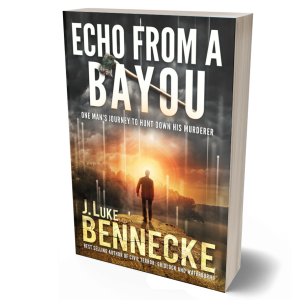 J. Luke Bennecke is a veteran civil engineer with a well-spent career helping people by improving Southern California roadways. He has a civil engineering degree, an MBA, a private pilot’s certificate, and is a partner in an engineering firm. He enjoys philanthropy and awards scholarships annually to high school seniors.
J. Luke Bennecke is a veteran civil engineer with a well-spent career helping people by improving Southern California roadways. He has a civil engineering degree, an MBA, a private pilot’s certificate, and is a partner in an engineering firm. He enjoys philanthropy and awards scholarships annually to high school seniors.
In addition to his debut novel, bestselling and award-winning thriller Civil Terror: Gridlock, Bennecke has written several other novels and screenplays, a creative process he thoroughly enjoys. His second Jake Bendel thriller, Waterborne, was published in 2021 by Black Rose Writing and received several awards. Echo from a Bayou is his latest suspense thriller with a supernatural twist, available now.
Bennecke resides in Southern California with his wife of 32+ years and three spunky cats. In his leisure time he enjoys traveling, playing golf, voiceover acting, and spending time with his grown daughters.
To stay caught up With J. Like Bennecke click on any of the following links: Website, Goodreads, Bookbub, Instagram, Twitter, Facebook.
Visit all the Stops on the Tour!
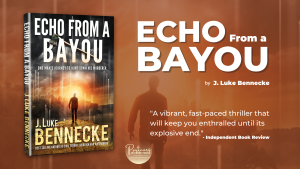
07/31 Guest post @ The Book Divas Reads
08/01 Showcase @ Celticladys Reviews
08/03 Interview @ Hott Books
08/05 Review @ Must Read Faster
08/06 Review @ Guatemala Paula Loves to Read
08/07 Showcase @ Books, Ramblings, and Tea
08/08 Review @ Lynchburg Reads
08/12 Review @ Avonna Loves Genres
08/13 Showcase @ The Mystery Section
08/15 Podcast interview @ Blog Talk Radio
08/15 Review @ Just Reviews
08/16 Showcase @ 411 ON BOOKS, AUTHORS, AND PUBLISHING NEWS
08/19 Showcase @ Silvers Reviews
08/21 Review @ mysteries. and. mayhem
08/22 Review @ elaine_sapp65
08/23 Guest post @ The Mystery of Writing
08/24 Review @ mokwip8991
08/25 Review @ Urban Book Reviews
Elena Taylor/Elena Hartwell


All We Buried, available now in print, e-book, and audio.
Silver Falchion Award Finalist, Best Investigator
Foreword INDIE Award Finalist, Best Mystery
The post Echo From a Bayou: New Suspense appeared first on The Mystery of Writing.

